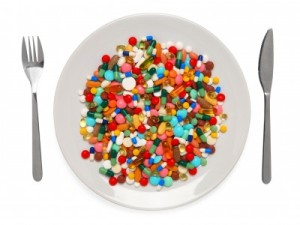An ongoing dialogue on HIV/AIDS, infectious diseases,
October 17th, 2012
It’s Time to Tell Our Patients to Stop Their Vitamin Supplements
 Over in JAMA, there’s a large study out today that (yet again) failed to demonstrate a benefit of vitamins.
Over in JAMA, there’s a large study out today that (yet again) failed to demonstrate a benefit of vitamins.
Over 3000 patients with HIV in Tanzania were randomized to receive either high-dose or standard-dose multivitamin supplementation, in addition to “HAART” (ugh). Though the study was planned for 24 months, it was stopped early by the Data Safety and Monitoring Board due to a higher rate of LFT abnormalities in the high-dose vitamin group. Not only that, the sickest patients — those with BMI < 16 — seemed to do even worse on the mega-dose, with a higher risk of death that almost reached statistical significance (relative risk 1.36; 95% CI, 0.93-1.98; p=.11).
One could quibble with the generalizability of the results to current standard of care in well-resourced areas — for example, the most common regimen was d4T, 3TC, and nevirapine, used in nearly 60% — but it’s hard to imagine how this makes the results less convincing. After all, one would expect that vitamin supplementation would be more important in settings where malnutrition and advanced HIV disease are highly prevalent.
So what should we do?
I’ve been keeping quiet with my patients who insist on taking handfuls of vitamins, despite their having access to real food and nothing at all to suggest dietary insufficiency. With this study, however, I will strongly encourage them to save their money — the only people benefiting from their daily intake are those in the $27-billion dollar/year vitamin industry.


I find this helpful but somewhat misleading. Most of my patients are happy w/ a single multivitamin pill daily. I often suggest a trial of mvi daily prior to starting ARVs to get them in the habit of taking meds regularly. Then I tell them to add the ARVs and if they ever feel like skipping a pill to skip the multivitamin (and always take the HIV meds). Sounds like “high-dose” or “mega-dose” vitamins are a bad idea, but I’m not sure it follows that: “It’s time to tell our patients to stop their vitamin supplements.